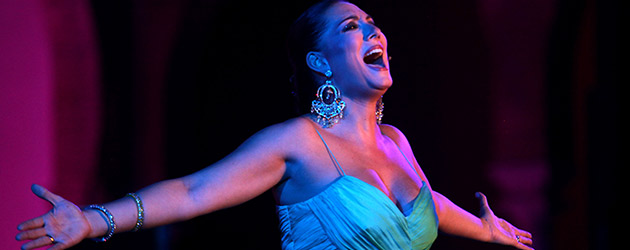Text: Estela Zatania
Photos: Antonio Acedo
18th Bienal de Flamenco de Sevilla
Thursday, September 18th, 2014. 2130h. Real Alcázar
SOME GREAT MOMENTS…AND ONE AWKWARD ONE
Main voice: Marina Heredia. Voice: Jaime Heredia «El Parrón». Piano: Joan Albert Amargós. Guitar: José Quevedo «El Bola», Miguel Ángel Cortés. Percussion: Paquito González. Palmas and chorus: Jara Heredia, Anabel Rivera. Trumpet: Julián Sánchez.
Throughout the afternoon in Seville, it had rained off and on, but the organization decided to go on with Marina Heredia's open-air performance at the Real Alcázar.
And we can be grateful for that. It would be hard to imagine a more beautiful and suitable venue for the occasion than the Patio de la Montería of the Palace of Pedro I to receive the Granada singer with her show «Garnata«, which is Granada in Arabic. This is a place that always takes your breath away, and the Mudéjar architecture set the mood perfectly. Marina herself commented that having spent her childhood alongside the Alhambra, she felt right at home.
The program began elegantly. Marina with her father, el Parrón, who sings an old «romance» in the style of el Negro del Puerto, with no accompaniment. The air thickens and the atmosphere helps us conjure up images of medieval kings and battles. Marina adds her voice with petenera, the natural continuation of the romance, and when José Quevedo «El Bola» adds the sound of a mandola to Miguel Ángel Cortés' guitar, you suddenly understand a milennium of Moslem Spanish history. The rough, worn voice of the father, and the toasted honey of Marina complement and contrast one another beautifully.
Marina, exquisitely elegant in her ways and appearance, with her voice subtly sandy, continues alone with tientos. Then alegrías, that el Bola accompanies in A position giving a different feel than that of Cádiz, and siguriyas which she ends brilliantly with the Juanichi closing.
Parrón returns for what turns out to be the best moment of the show, an affectionate facing-off between father and dauther por soleá and with the two guitars. «My father is an encyclopedia with legs» says Marina, whose face glows with pride each time her father sings, and you grasp the advantage of growing up with cante right at home. It was soleá, but with the crisp pace of soleá por bulería. First he sang several verses. Then Marina. Then taking turns again…and again. And you contemplate the two generations. The rough-hewn man with the warm, natural delivery. The young, impeccably groomed woman, flamenca without the folklore, singing the way she learned from her progenitor. El Bola and Cortés make an effort to play traditional accompaniment without contemporary harmony, and it's all wonderful.
El Bola dedicates his guitar solo of soleá por bulería to Curro Romero who is present in the audience. Being a native of Jerez, you expect more of the characteristic sound, but no. The piece could be described as pan-European hip with few flamenco references. And then came the moment no one was prepared for. Pianist and composer Joan Albert Amargós, and trumpet-player Julián Sánchez came on stage to accompany the Marina for the syrupy bolero «Quiero Hablar Contigo»…not set to bulerías or tangos, but in true piano bar style. Afterwards, the singer justified the tangent explaining that many influences have passed through Granada, and that song was a memory of the Rey Chico cabaret. The audience didn't quite swallow it, and yet she went on to sing a Mexican ballad that was equally inappropriate. Marina seemed to realize her faux pas, and commented «relax, now we'll get back to flamenco».
The rest of the show was fandangos de Huelva and abandolao, and an interesting arrangement of the Mosca and the Cachucha, straight-ahead Granada without seeming like a museum piece thanks to Bola's accompaniment. Tangos, with sounds of María la Canastera, and a song by David Palomar por bulerías rounded out this show that flirted with disaster, but managed to squeak past a difficult moment.
At eleven o'clock, at the Teatro Central, veteran dancer Merche Esmeralda, with the singing of el Boquerón and Jesús Guerrero on guitar, and under the direction of Juana Casado, offered the debut of her work «Última Parada».
